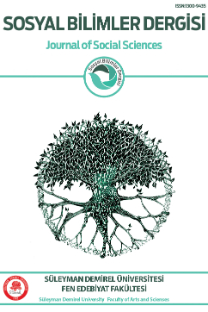Bureaucratic Reputation in Higher Education: A Case Study
reputation, bureaucratic reputation, higher education institutions
___
- Parnell, J. A., & Dent, E. B. (2009). Philosophy, ethics, and capitalism: An interview with BB&T chairman John Allison. Academy of Management Learning & Education, 8(4), 587-596.
- Sataøen, H. L. (2019). Sub-sector branding and nation branding: the case of higher education. Corporate Communications: An International Journal, 24(3), 425-438.
- Shenton, A. K. (2004). Strategies for ensuring trustworthiness in qualitative research projects. Education for Information, 22(2), 63-75.
- Stemler, S. (2000). An overview of content analysis. Practical Assessment, Research, and Evaluation, 7(1), 1-6.
- Subaşı, M. and Okumuş, K. (2017). Bir araştırma yöntemi olarak durum çalışması [Case study as a research method]. Atatürk Üniversitesi Sosyal Bilimler Enstitüsü Dergisi [Atatürk Uiversity Social Sciences Institute Journal], 21(2), 419-426.
- Toygar, Ş. A. (2011). Ankara İl Merkezindeki Sağlık Bakanlığına bağlı hastanelerdeki hastane yöneticilerinin problem çözme ve karar verme becerilerinin değerlendirilmesi [Evaluation of the problem-solving and decision-making skills of hospital managers in hospitals affiliated to the Ministry of Health in the city of Ankara]. (Master's thesis). Ankara Üniversitesi Sağlık Bilimleri Enstitüsü) [Ankara University Health Sciences Institute]. Ankara
- Ulutürk, S. (2015). Yeni kamu işletmeciliği yaklaşımından hareketle üniversitelerde performans uygulaması üzerine bir değerlendirme [An evaluation on the performance application in universities based on the new public management approach]. Süleyman Demirel Üniversitesi İktisadi ve İdari Bilimler Fakültesi Dergisi [Sülyeman Demirel University Economics and Administrative Sciences Faculty Journal], 20(4). 395-414
- Usta, A. (2010). Kamu kurumlarında örgütsel performans yönetim süreci [Organizational performance management process in public institutions]. Sayıştay Dergisi [Audit Court Journal], (78), 31-58.
- Van Vught, F. (2008). Mission diversity and reputation in higher education. Higher Education Policy, 21(2), 151-174.
- ISSN: 1300-9435
- Yayın Aralığı: 3
- Başlangıç: 1995
- Yayıncı: Süleyman Demirel Üniversitesi, Fen-Edebiyat Fakültesi
Osmanlı Modern Eğitim Anlayışının Taşraya Yansımasına Bir Örnek: Tefenni Rüştiye Mektebi
Boşanma Olgusunun Behiç Ak’ın “Ayrılık” Oyununda Ele Alınışı
Şifa KAYABAŞI, Mustafa KAYABAŞI
Kalymnos Ressamı’nın Kaunos’ta Ele Geçen Bir Skyphosu
Demetrios Kydones ve Türkler Hakkındaki Görüşleri
Bir Tecavüz/İntikam Filmi Olarak Kuyu (1968)
Problemli Akıllı Telefon Kullanımı ve Teknostres
Aktivite Kuramı Çerçevesinde Yaşlıların Eğitimi
Bows Used as Symbols of Military Victory in the Neo-Assyrian Period
Genç Cumhuriyetin Parti Sistemi Arayışı: Terakkiperver Cumhuriyet Fırkası
Gökhan TURHAN, Mehmet Serdar ÇULHA
